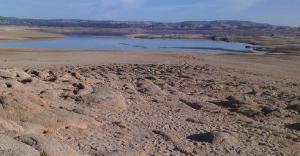Emerging threatsSevere drought no longer caused just by nature
Scientists are calling on drought researchers and managers around the world to consider both human activity and natural phenomena in their battle to preserve increasingly scarce global water supplies. The experts say that severe droughts experienced recently in countries such as China, Brazil and the United States can no longer be seen as purely natural hazards. Changes to the way people use the water and the landscape contribute to extreme water shortages.

Evaporating and declining of Folsom Lake Reservoir, CA // Source: usgs.gov
Scientists at the University of Birmingham are calling on drought researchers and managers around the world to consider both human activity and natural phenomena in their battle to preserve increasingly scarce global water supplies. The experts say that severe droughts experienced recently in countries such as China, Brazil and the United States can no longer be seen as purely natural hazards. Changes to the way people use the water and the landscape contribute to extreme water shortages.
U Birmingham reports that the University’s Water Science Research Group isleading key researchers from thirteen organizations in eight countries to redefine how the world should study and tackle drought. The researchers propose broadening the definition of drought to include water shortage caused and made worse — or sometimes improved - by human activity.
Drought research should no longer view water availability as a solely natural, climate-imposed phenomenon and water use as simply a socio-economic issue. It should, instead, more carefully consider the complex interactions between nature and society.
The current California drought has severely affected the state’s environment and economy. Storing water in reservoirs and extracting groundwater increase evaporation and decrease groundwater levels, making the drought worse. It demonstrates how strongly water and society are intertwined during drought periods.
Europe suffered a severe drought last summer with high heat causing soils and plants to dry out helping to spread wildfires. Agricultural and hydropower production decreased, whilst rivers fell to record low levels and inland water transport shut down in some places. Water and drought policies vary across the EU and more work is needed to understand their influence on drought.
University of Birmingham Water Science Lecturer Dr. Anne Van Loon said: “Society is not a passive victim of drought; it responds to water shortages and these responses again influence water levels in reservoirs, aquifers and rivers. Severe droughts in human-dominated environments, as experienced in recent years in China, Brazil and the USA, cannot be seen as purely natural hazards because human activities play a role.
“Managing drought effectively means we must acknowledge that human influence is as integral to drought as natural climate variability. This is why we’re calling for research to explicitly consider the multidirectional relationship between natural drought processes and the role of people.”
